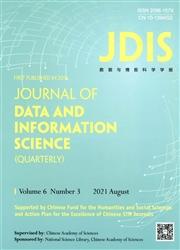检测科学交流中的法学硕士辅助写作:我们到了吗?
IF 1.5
3区 管理学
Q2 INFORMATION SCIENCE & LIBRARY SCIENCE
引用次数: 0
摘要
以 ChatGPT 为代表的大型语言模型(LLM)极大地重塑了文本生成,尤其是在写作辅助领域。虽然道德方面的考虑强调了以透明方式承认使用 LLM 的重要性,尤其是在科学交流中,但真正的承认仍然很少见。鼓励准确承认 LLM 辅助写作的一个潜在途径是使用自动检测器。我们对四种最先进的 LLM 生成文本检测器进行了评估,结果显示,与简单的临时检测器相比,它们的性能并不理想。我们认为,有必要开发专门用于 LLM 辅助写作检测的专用检测器。这种检测器可以在促进更真实地识别 LLM 参与科学交流方面发挥关键作用,从而解决目前在鸣谢实践中面临的挑战。本文章由计算机程序翻译,如有差异,请以英文原文为准。
Detecting LLM-assisted writing in scientific communication: Are we there yet?
Large Language Models (LLMs), exemplified by ChatGPT, have significantly reshaped text generation, particularly in the realm of writing assistance. While ethical considerations underscore the importance of transparently acknowledging LLM use, especially in scientific communication, genuine acknowledgment remains infrequent. A potential avenue to encourage accurate acknowledging of LLM-assisted writing involves employing automated detectors. Our evaluation of four cutting-edge LLM-generated text detectors reveals their suboptimal performance compared to a simple ad-hoc detector designed to identify abrupt writing style changes around the time of LLM proliferation. We contend that the development of specialized detectors exclusively dedicated to LLM-assisted writing detection is necessary. Such detectors could play a crucial role in fostering more authentic recognition of LLM involvement in scientific communication, addressing the current challenges in acknowledgment practices.
求助全文
通过发布文献求助,成功后即可免费获取论文全文。
去求助
来源期刊

Journal of Data and Information Science
INFORMATION SCIENCE & LIBRARY SCIENCE-
CiteScore
3.50
自引率
6.70%
发文量
495
期刊介绍:
JDIS devotes itself to the study and application of the theories, methods, techniques, services, infrastructural facilities using big data to support knowledge discovery for decision & policy making. The basic emphasis is big data-based, analytics centered, knowledge discovery driven, and decision making supporting. The special effort is on the knowledge discovery to detect and predict structures, trends, behaviors, relations, evolutions and disruptions in research, innovation, business, politics, security, media and communications, and social development, where the big data may include metadata or full content data, text or non-textural data, structured or non-structural data, domain specific or cross-domain data, and dynamic or interactive data.
The main areas of interest are:
(1) New theories, methods, and techniques of big data based data mining, knowledge discovery, and informatics, including but not limited to scientometrics, communication analysis, social network analysis, tech & industry analysis, competitive intelligence, knowledge mapping, evidence based policy analysis, and predictive analysis.
(2) New methods, architectures, and facilities to develop or improve knowledge infrastructure capable to support knowledge organization and sophisticated analytics, including but not limited to ontology construction, knowledge organization, semantic linked data, knowledge integration and fusion, semantic retrieval, domain specific knowledge infrastructure, and semantic sciences.
(3) New mechanisms, methods, and tools to embed knowledge analytics and knowledge discovery into actual operation, service, or managerial processes, including but not limited to knowledge assisted scientific discovery, data mining driven intelligent workflows in learning, communications, and management.
Specific topic areas may include:
Knowledge organization
Knowledge discovery and data mining
Knowledge integration and fusion
Semantic Web metrics
Scientometrics
Analytic and diagnostic informetrics
Competitive intelligence
Predictive analysis
Social network analysis and metrics
Semantic and interactively analytic retrieval
Evidence-based policy analysis
Intelligent knowledge production
Knowledge-driven workflow management and decision-making
Knowledge-driven collaboration and its management
Domain knowledge infrastructure with knowledge fusion and analytics
Development of data and information services
 求助内容:
求助内容: 应助结果提醒方式:
应助结果提醒方式:


